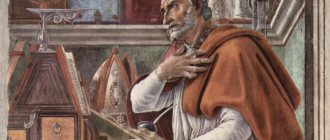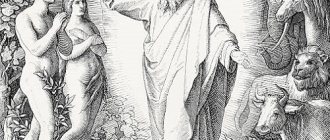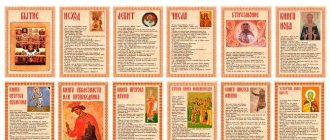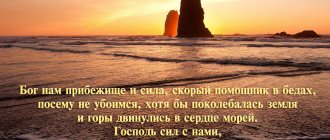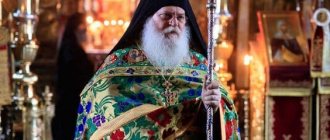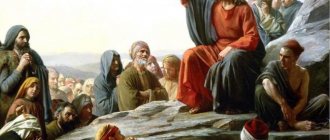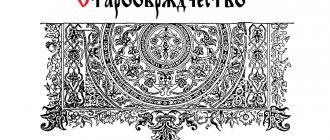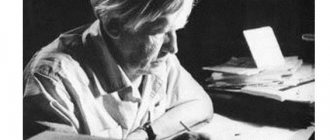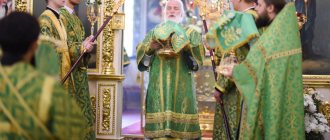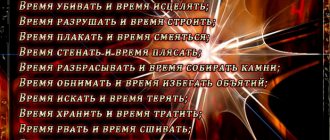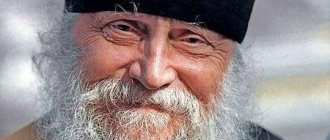Thomas Aquinas. Portrait by C. Crivelli. OK. 1435. National Gallery (London).
THOMAS Aquinas (c. 1225, Roccasecca, near Aquino, Italy - 7.3.1274, Fossanova, ibid.), Catholic. theologian and philosopher, teacher of the Church; the honorary nickname of the Angelic Teacher (Doctor angelicus) and the General Teacher (Doctor communis). Dominican monk (since 1244). He studied at the monastery school of Monte Cassino, at the University of Naples (1239–1244), then with Albert the Great at the high boots of Paris (1245–48) and Cologne (1248–52). In 1252–59 he taught in Paris, from 1259 in Italy, in 1265–68 in Rome, in 1268–1272 again in Paris. Died in Mon. Fossanova on the way to the 2nd Council of Lyon, where he was invited by Pope Gregory X. Canonized in 1323. Found. works: “Summa theologiae” (“Summa theologiae”, or “Summa theologica”), “Summa contra gentiles”, sometimes also called “Summa philosophiae”, “Commentary on “ Maxims" by Peter of Lombardy, "On Truth", "On the Unity of Reason against the Averroists", "On the Eternity of the World", various "Questions" ("On the Power of God", "On Evil", "On Spiritual Creations", etc.) , comments on the works of Aristotle, Dionysius the Areopagite, Boethius, etc.
F. A.'s creativity marks the heyday of the Middle Ages. scholastic thoughts. Striving to create a complete and comprehensive theological system, F. A. actively used in his work almost all the philosophers known at that time in the West. and scientific sources and ideas. At the same time, F. A. showed special interest in the heritage of Aristotle and the Peripatetic school; borrowing from Aristotle's philosophy terminology, methodology, many others. elements of natural philosophy, psychology, ethics, etc., while he radically changed its content, adapting it to the needs of Christian doctrine.
Biographical facts
Approximate years of life of Thomas Aquinas: from 1225 to 1274. He was born in the Roccasecca castle, located near Naples. Thomas's father was a feudal baron, and gave his son the title of abbot of the Benedictine monastery. But the future philosopher chose to engage in science. Thomas ran away from home and joined a monastic order. During the order's trip to Paris, the brothers kidnapped Thomas and imprisoned him in a fortress. After 2 years, the young man managed to escape and officially took a vow, becoming a member of the order and a student of Albertus Magnus. He studied at the University of Paris and Cologne, became a teacher of theology and began writing his first philosophical works.
Thomas was later called to Rome, where he taught theology and served as an adviser on theological issues to the Pope. After spending 10 years in Rome, the philosopher returned to Paris to take part in popularizing the teachings of Aristotle in accordance with Greek texts. Before this, a translation made from Arabic was considered official. Thomas believed that the Eastern interpretation distorted the essence of the teaching. The philosopher sharply criticized the translation and sought a complete ban on its distribution. Soon, he was again called to Italy, where he taught and wrote treatises until his death.
The main works of Thomas Aquinas are the Summa Theologica and the Summa Philosophia. The philosopher is also known for his reviews of treatises by Aristotle and Boethius. He wrote 12 church books and the Book of Parables.
About indulgences
Thomas Aquinas resolved a number of doubts associated with the practice of granting (and purchasing) indulgences. He shared the concept of the “treasury of the church” - a kind of “excessive” supply of virtues, replenished by Jesus Christ, the Virgin Mary and the saints, from which other Christians can draw. The Pope can dispose of this “treasury” by issuing special acts that are legal in nature—indulgences. Indulgences work only because the holiness of some members of the Christian community outweighs the sinfulness of others.
Fundamentals of philosophical teaching
Thomas distinguished between the concepts of “philosophy” and “theology”. Philosophy studies questions accessible to reason and touches only those areas of knowledge that relate to human existence. But the possibilities of philosophy are limited; man can only know God through theology.
Thomas formed his idea of the stages of truth on the basis of the teachings of Aristotle. The ancient Greek philosopher believed that there are 4 of them:
- experience;
- art;
- knowledge;
- wisdom.
Thomas placed wisdom above other levels. Wisdom is based on the revelations of God and is the only way of Divine knowledge.
According to Thomas, there are 3 types of wisdom:
- grace;
- theological - allows you to believe in God and Divine Unity;
- metaphysical - comprehends the essence of being using reasonable conclusions.
With the help of reason, a person can realize the existence of God. But the questions of the appearance of God, the resurrection, and the Trinity remain inaccessible to her.
Biography of Thomas Aquinas by G. K. Chesterton
In this book, the author resorts to fiction in order to better illustrate the life of the hero of our article. He combines journalistic and confessional genres in order to better convey the atmosphere. Literally speaking, Gilbert Keith simply transformed the biography genre in its classical sense. Despite the use of artistic techniques, he completely preserves the authenticity of historical facts, and on the basis of some data even denies incorrect information or interpretations that arose from the legends of Aquinas.
Types of being
The life of a person or any other creature confirms the fact of his existence. The opportunity to live is more important than the true essence, since only God provides such an opportunity. Every substance depends on divine desire, and the world is the totality of all substances.
Existence can be of 2 types:
- independent;
- dependent.
True being is God. All other beings depend on him and obey the hierarchy. The more complex the nature of a being, the higher its position and the greater the freedom of action.
Combination of form and matter
Matter is a substrate that has no form. The appearance of a form creates an object and endows it with physical qualities. The unity of matter and form is the essence. Spiritual beings have complex essences. They do not have physical bodies; they exist without the participation of matter. Man is created from form and matter, but he also has an essence that God has endowed him with.
Since matter is uniform, all creatures created from it could be the same shape and become indistinguishable. But, according to God's will, form does not determine the being. The individualization of an object is formed by its personal qualities.
Basic principles of Thomism
Based on ancient teachings and Christian dogmas, Thomas identified five proofs of the existence of God:
- Prime mover. According to Aquinas, everything that happens in the world happens after a push from the outside; everything that moves comes into motion according to the will of God.
- The root cause. There is no such event that would be the cause of itself, therefore, there are higher powers behind it.
- Necessity. Everything that we consider to exist was created for some purpose, with some necessity. This need lies in the intangible sphere.
- Degrees of being. Humanity strives with every step towards a better, new degree of being, different from the previous one. Everything that exists is in the stage of perfection, and the highest perfection is the Creator.
- An end cause implies the existence of one who posits that end. The philosopher argued that everything in the world has a goal and moves towards it.
In his teaching, Thomas Aquinas also determined the principles to which everything that exists is subject. Basic principles of being, according to Aquinas:
- Everything that exists on earth consists of matter and idea;
- Existence is nothing other than the unity of matter and idea;
- The idea is the basis, and matter is only the form;
- The idea exists in the Divine plan, in its own form and in human perception.
Important! Many church truths, such as the resurrection of Christ, defy rational explanation, as they testify to the supernatural qualities of God.
Ideas about the soul
The unity of soul and body creates the individuality of a person. The soul has a divine nature. It was created by God to give man the opportunity to achieve bliss by joining his Creator after the end of earthly life. The soul is an immortal independent substance. It is intangible and inaccessible to the human eye. The soul becomes complete only at the moment of unity with the body. A person cannot exist without a soul; it is his life force. All other living beings do not have a soul.
Man is an intermediate link between angels and animals. He is the only one of all corporeal beings who has the will and desire for knowledge. After bodily life, he will have to answer to the Creator for all his actions. A person cannot get close to angels - they never had a physical form, in their essence they are flawless and cannot commit actions that contradict divine plans.
A person is free to choose between good and sin. The higher his intellect, the more actively he strives for good. Such a person suppresses animal aspirations that denigrate his soul. With every action he moves closer to God. Inner aspirations are reflected in appearance. The more attractive an individual is, the closer he is to the divine essence.
THOMAS AQUINAS
(c. 1224, Rocca Secca, Italy - 1274, Fossanova, Italy) - medieval theologian and philosopher, Dominican monk (from 1244).
He studied at the University of Naples, in Paris, and from 1248 with Albertus Magnus in Cologne. In 1252–59 he taught in Paris. He spent the rest of his life in Italy, only in 1268–72 he was in Paris, conducting polemics with the Parisian Averroists regarding the interpretation of the Aristotelian doctrine of the immortality of the active mind-intellect ( nous
)
.
The works of Thomas Aquinas include
the Summa Theologica
and
the Summa Contra Gentiles
(Summa Philosophia), discussions of theological and philosophical problems (Debatable Questions and Questions on Various Subjects), detailed commentaries on several books of the Bible, 12 Aristotle's treatises, on the "Sentences"
of Peter of Lombardy
, on the treatises of Boethius, Pseudo-Dionysius the Areopagite, the anonymous
"Book of Causes"
and others. "Debatable Questions" and "Commentaries" were largely the fruit of his teaching activity, which included, according to the tradition of that time , debates and reading authoritative texts. The greatest influence on the philosophy of Thomas was exerted by Aristotle, who was largely rethought by him.
The system of Thomas Aquinas is based on the idea of a fundamental agreement between two truths - those based on Revelation and those deduced by human reason. Theology starts from the truths given in Revelation and uses philosophical means to reveal them; philosophy moves from the rational understanding of what is given in sensory experience to the justification of the supersensible, for example. the existence of God, His unity, etc. (In Boethium De Trinitate, II 3).
Thomas identifies several types of knowledge: 1) absolute knowledge of all things (including individual, material, random), carried out in a single act by the highest mind-intellect; 2) knowledge without reference to the material world, carried out by created immaterial intelligentsia and 3) discursive knowledge, carried out by the human intellect. The theory of “human” knowledge (S. th. I, 79–85; De Ver. I, 11) is formed in polemics with the Platonic doctrine of ideas as objects of knowledge: Thomas rejects the independent existence of ideas (they can only exist in the divine intellect as prototypes of things, in individual things and in the human intellect as a result of the knowledge of things - “before a thing, in a thing, after a thing”), and the presence of “innate ideas” in the human intellect. Sensory knowledge of the material world is the only source of intellectual knowledge that uses “self-evident grounds” (the main one is the law of identity), which also do not exist in the intellect before knowledge, but are manifested in its process. The result of the activity of the five external senses and internal senses (“general sense”, which synthesizes the data of external senses, imagination, which preserves phantasmatic images, sensory assessment – the ability to make specific judgments inherent not only in humans, but also in animals, and memory, which preserves the assessment of the image) are “sensible species”, from which, under the influence of the active intellect (which is part of man, and not an independent “active intelligentsia”, as the Averroists believed), “intelligible species”, completely cleared of material elements, are abstracted, perceived by the “possible intellect” (intellectus possibilis ). The final phase of cognition of a specific thing is a return to the sensory images of material things stored in fantasy.
Knowledge of non-material objects (truth, angels, God, etc.) is possible only on the basis of knowledge of the material world: thus, we can deduce the existence of God based on the analysis of certain aspects of material things (movement ascending to a motionless prime mover; cause-and-effect relationship , ascending to the root cause; various degrees of perfection, ascending to absolute perfection; the randomness of the existence of natural things, requiring the existence of an absolutely necessary being; the presence of expediency in the natural world, indicating the rational management of it (S. p. G. I, 13; S. th . I, 2, 3; "Compendium of Theology" I, 3; "On Divine Power" III, 5). Such a movement of thought from what is known in experience to its cause and ultimately to the first cause gives us knowledge not of what this the first cause, but only that it exists. Knowledge of God is primarily negative in nature, but Thomas strives to overcome the limitations of apophatic theology
: “to be existing” in relation to God is a definition not only of the act of existence, but also of essence, since in God essence and existence coincide (being different in all created things): God is being itself and the source of being for all that exists.
God as a being can also be predicated on transcendentals
- such as “one”, “true” (being in relation to the intellect), “good” (being in relation to desire), etc.
The opposition “existence-essence”, actively used by Thomas, covers the traditional oppositions of act and potency
and
form and matter
: form, which gives existence to matter as pure potency and is the source of activity, becomes potency in relation to the pure act - God, who gives the form existence.
Based on the concept of the difference between essence and existence in all created things, Thomas polemicizes with the widespread concept of total hylemorphism
of Ibn Gebirol, denying that the highest intelligences (angels) consist of form and matter (De ente et essentia, 4).
God creates numerous kinds and kinds of things required for the completeness of the universe (which has a hierarchical structure) and endowed with varying degrees of perfection. A special place in creation is occupied by man, who is the unity of the material body and soul as a form of the body (in contrast to the Augustinian understanding of man as a “soul using the body,” Thomas emphasizes the psychophysical integrity of man). Although the soul is not subject to destruction when the body is destroyed due to the fact that it is simple and can exist separately from the body, it acquires its perfect existence only in connection with the body: in this Thomas sees an argument in favor of the dogma of resurrection in the flesh (“On the Soul” , 14).
Man differs from the animal world in his ability to cognize and, therefore, make free, conscious choice, which lies at the basis of truly human – ethical – actions. In the relationship between the intellect and the will, the advantage belongs to the intellect (a position that caused controversy between the Thomists and the Scotists), since it is the intellect that represents this or that being as good for the will; however, when an action is performed in specific circumstances and with the help of certain means, volitional effort comes to the fore (De malo, 6). To perform good actions, along with a person’s own efforts, divine grace is also required, which does not eliminate the uniqueness of human nature, but improves it. Divine control of the world and the prediction of all (including random) events do not exclude freedom of choice: God allows independent actions of secondary causes, incl. and entailing negative moral consequences, since God is able to turn to good the evil created by independent agents.
Being the first cause of all things, God is at the same time the ultimate goal of their aspirations; the ultimate goal of human action is the achievement of beatitude, which consists in the contemplation of God (impossible, according to Thomas, within the limits of this life), all other goals are evaluated depending on their focus on the final goal, deviation from which constitutes evil (De malo, 1). At the same time, Thomas paid tribute to activities aimed at achieving earthly forms of bliss.
The beginnings of actual moral acts on the internal side are virtues, and on the external side – laws and grace. Thomas analyzes the virtues (skills that allow people to consistently use their abilities for good - S. th. I–II, 59–67) and their opposing vices (S. th. I–II, 71–89), following the Aristotelian tradition, however he believes that in order to achieve eternal happiness, in addition to virtues, there is a need for the gifts, beatitudes and fruits of the Holy Spirit (S. th. I–II, 68–70). Thomas does not think of moral life without the presence of theological virtues - faith, hope and love (S. th. II-II, 1-45). Following the theological ones are four “cardinal” (fundamental) virtues - prudence and justice (S. th. II–II, 47–80), courage and moderation (S. th. II–II, 123–170), which are associated with other virtues.
Law (S. th. I–II, 90–108) is defined as “any command of reason which is proclaimed for the common good by those who care for the public” (S. th. I–II, 90, 4). The eternal law (S. th. I-II, 93), by means of which divine providence governs the world, does not make superfluous other types of law flowing from it: natural law (S. th. I-II, 94), the principle of which is the fundamental the postulate of Thomistic ethics - “one should strive for good and do good, but evil should be avoided”; human law (S. th. I–II, 95), which specifies the postulates of natural law (defining, for example, the specific form of punishment for evil committed) and the power of which Thomas limits to the conscience that opposes the unjust law. Historically established positive legislation - a product of human institutions - can be changed. The good of the individual, society and the universe is determined by the divine plan, and a person’s violation of divine laws is an action directed against his own good (S. p. G. III, 121).
Following Aristotle, Thomas considered social life natural for man and identified six forms of government: fair - monarchy, aristocracy and “polity” and unjust - tyranny, oligarchy and democracy. The best form of government is monarchy, the worst is tyranny, the fight against which Thomas justified, especially if the tyrant’s regulations clearly contradict divine regulations (for example, forcing idolatry). The unity of a just monarch must take into account the interests of various groups of the population and does not exclude elements of the aristocracy and polity. Thomas placed ecclesiastical authority above secular authority.
The teachings of Thomas Aquinas had a great influence on Catholic theology and philosophy, which was facilitated by the canonization of Thomas in 1323 and his recognition as the most authoritative Catholic theologian in the encyclical Aeterni patris of Pope Leo XIII (1879). See Thomism
,
Neo-Thomism
.
Essays:
1. Full collection op. – “Piana” in 16 volumes. Rome, 1570;
2. Parma edition in 25 volumes, 1852–1873, reprint. in New York, 1948–50;
3. Opera Omnia Vives, in 34 volumes. Paris, 1871–82;
4. "Leonina". Rome, since 1882 (since 1987 - republication of previous volumes); published by Marietti, Turin;
5. edition of R. Bus Thomae Aquinatis Opera omnia, ut sunt in indice thomistico, Stuttg. – Bad Cannstatt, 1980;
6. in Russian trans.: Discussion questions about truth (question 1, ch. 4–9), On the unity of the intellect against the Averroists. – In the book: Goodness and truth: classical and non-classical regulators. M., 1998;
7. Commentary on Aristotle’s Physics (Book I. Introduction, Sent. 7–11). – In the book: Philosophy of nature in Antiquity and the Middle Ages, part 1. M., 1998;
8. About mixing elements. – Ibid., part 2. M., 1999;
9. About the attack of demons. – “Man”, 1999, No. 5;
10. About existence and essence. – In the book: Historical and Philosophical Yearbook – 88. M., 1988;
11. About the rule of sovereigns. – In the book: Political structures of the era of feudalism in Western Europe 6th – 17th centuries. L., 1990;
12. About the principles of nature. – In the book: Time, truth, substance. M., 1991;
13. Summa of Theology (Part I, Question 76, Art. 4). – “Logos” (M.), 1991, No. 2;
14. Summa Theologija I–II (question 18). – “VF”, 1997, No. 9;
15. Proofs of the existence of God in the Summa against the pagans and the Summa Theology. M., 2000.
Literature:
1. Bronzov A.
Aristotle and Thomas Aquinas in relation to their teaching on morality. St. Petersburg, 1884;
2. Borgosh Yu.
Thomas Aquinas. M., 1966, 2nd ed. M., 1975;
3. Dzikevich E.A.
Philosophical and aesthetic views of Thomas Aquinas. M., 1986;
4. Gretsky S.V.
Problems of anthropology in the philosophical systems of Ibn Sina and Thomas Aquinas. Dushanbe, 1990;
5. Chesterton G.
Saint Thomas Aquinas.
– In the book: He is the same.
Eternal man. M., 1991;
6. Gertykh V.
Freedom and moral law in Thomas Aquinas. – “VF”, 1994, No. 1;
7. Maritain J.
Philosopher in the world. M., 1994;
8. Gilson E.
Philosopher and theology. M., 1995;
9. Swierzawski S.
Saint Thomas read anew. – “Symbol” (Paris) 1995, No. 33;
10. Copleston F.C.
Aquinas. Introduction to the philosophy of the great medieval thinker. Dolgoprudny, 1999;
11. Gilson E.
Saint Thomas d'Aquin. P., 1925;
12. Idem.
Moral Values and Moral Life. St. Louis – L., 1931;
13. Grabmann M.
Thomas von Aquin. Münch., 1949;
14. Sertillanger AD
Der heilige Thomas von Aquin. Köln–Olten, 1954;
15. Aquinas: A collection of Critical Essays. L. - Melbourne, 1970;
16. Thomas von Aquin. Interpretation und Rezeption: Studien und Texte, hrsg. von WPEckert. Mainz, 1974;
17. Aquinas and Problems of his Time, ed. by G.Verbeke. Leuven – The Hague, 1976;
18. Weisheipl J.
Friar Thomas Aquinas. His Life, Thought, and Works. Wash., 1983;
19. Copleston F.C.
Aquinas. L., 1988;
20. The Cambridge Companion to Aquinas, ed. by N. Kretzmann and E. Stump. Cambr., 1993.
K.V. Bandurovsky
Types of knowledge
In the concept of Thomas Aquinas there were 2 types of intelligence:
- passive - needed for the accumulation of sensory images, does not take part in the thinking process;
- active - separated from sensory perception, forms concepts.
To know the truth, you need to have high spirituality. A person must tirelessly develop his soul, endow it with new experiences.
There are 3 types of knowledge:
- reason - gives a person the ability to form reasoning, compare them and draw conclusions;
- intelligence - allows you to understand the world by forming images and studying them;
- mind is the totality of all spiritual components of a person.
Knowledge is the main calling of a rational person. It elevates him above other living beings, ennobles him and brings him closer to God.
First meeting
Let's begin our examination of the biography of Thomas Aquinas with a quick acquaintance with him. This is an outstanding scientist who is a theologian and philosopher. Moreover, he was canonized by the Catholic Church. He is the largest systematizer of orthodox scholasticism and teacher of the church. He is distinguished by the fact that he was the first to find connecting threads between the philosophy of Aristotle and the Christian faith.
Ethics
Thomas believed that God is absolute good. A person striving for good is guided by the commandments and does not allow evil into his soul. But God does not force a person to be guided only by good intentions. It gives people free will: the ability to choose between good and evil.
A person who knows his essence strives for good. Believes in God and the primacy of his plan. Such an individual is full of hope and love. His aspirations are always prudent. He is peaceful, humble, but at the same time brave.
Quotes
Let the thoughts contained in books be your main capital, and the thoughts that arise in you yourself be the interest on it.
A happy person needs friends, and not in order to benefit from them, for he himself succeeds, and not in order to admire them, for he possesses the perfect delights of a virtuous life, but actually in order to do good deeds for friends.
Rulers need wise men much more than wise men need rulers.
I have often regretted what I have said, but rarely have I regretted being silent.
Political Views
Thomas shared Aristotle's opinion about the political system. Society needs management. The ruler must maintain peace and be guided in his decisions by the desire for the common good.
Monarchy is the optimal form of government. A single ruler represents the divine will; he takes into account the interests of individual groups of subjects and respects their rights. The monarch must submit to church authority, since the ministers of the church are servants of God and proclaim His will.
Tyranny as a form of power is unacceptable. It contradicts the highest plan and contributes to the emergence of idolatry. The people have the right to overthrow such a government and ask the Church to choose a new monarch.
